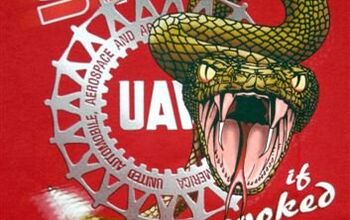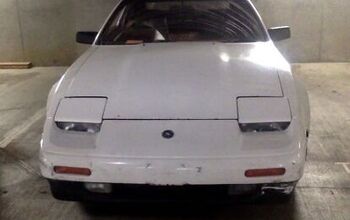GM To UAW: Take This Job And Keep It
When the music finally stopped at Old GM, the UAW’s VEBA fund was left holding a lot of IOUs. On those merits, the union’s benefit trust was given about 17.5 percent of the equity in the bailed-out and re-organized New GM. UAW leadership has always maintained that having its membership’s benefits staked on the company’s financial performance would not change its mission, and that VEBA’s representative on GM’s board, Steve Girsky, would operate free from union influence. And one hopes he would, considering he’s being paid well to advise CEO Ed Whitacre. But the tension between GM’s IPO sprint and the UAW’s non-VEBA interests never goes away, and the Wall Street Journal [sub] is reporting that the latest spat is over the old hobbyhorse of buyouts.
If GM doesn’t thin its ranks, scores of veteran factory workers in the next few years will find themselves without jobs or unemployment benefits.Laid-off factory workers once could remain on GM’s payroll for years receiving almost full pay and benefits, but now they can remain on the rolls no longer than two years before their company-paid unemployement benefits run out.
See? Before, laid-off workers could receive full pay and benefits for years, and now laid-off workers only receive benefits for years. And now, having cut costs all over, GM isn’t interested in paying experienced workers to learn. With production steadily expanding, GM has “restored or created 9,100 jobs” since bankruptcy, and under two-tier wage structures those new workers are being paid competitively. So the old guys who are making nearly twice as much should get their own private bailouts, at the expense of GM’s financial health (on which the larger union’s benefits depend)? Time Magazine knows what’s up, and chronicles the toxic effects of two-tier wages on the union, complete with quotes like “It destroys solidarity.”
But GM doesn’t want to go back to 2006, when it paid $3.8b to buyout 34,000 workers (do the math). With today’s announcement it has essentially ruled out any further buyouts. Now it’s up to the UAW to balance its own competing interests and do the right thing.
More by Edward Niedermeyer
Latest Car Reviews
Read moreLatest Product Reviews
Read moreRecent Comments
- Mebgardner I test drove a 2023 2.5 Rav4 last year. I passed on it because it was a very noisy interior, and handled poorly on uneven pavement (filled potholes), which Tucson has many. Very little acoustic padding mean you talk loudly above 55 mph. The forums were also talking about how the roof leaks from not properly sealed roof rack holes, and door windows leaking into the lower door interior. I did not stick around to find out if all that was true. No talk about engine troubles though, this is new info to me.
- Dave Holzman '08 Civic (stick) that I bought used 1/31/12 with 35k on the clock. Now at 159k.It runs as nicely as it did when I bought it. I love the feel of the car. The most expensive replacement was the AC compressor, I think, but something to do with the AC that went at 80k and cost $1300 to replace. It's had more stuff replaced than I expected, but not enough to make me want to ditch a car that I truly enjoy driving.
- ToolGuy Let's review: I am a poor unsuccessful loser. Any car company which introduced an EV which I could afford would earn my contempt. Of course I would buy it, but I wouldn't respect them. 😉
- ToolGuy Correct answer is the one that isn't a Honda.
- 1995 SC Man it isn't even the weekend yet


































Comments
Join the conversation
Those redundacy payements were negotiated in good faith by adults on both sides. They traded off higher immediate pay rises for long term benefits. With 20/20 hindsight, perhaps one side or the other miscalculated. If in your wage negotiations you never had to consider the long term implications of your contract that merely demosntrates your misunderstanding of the situation.
Somebody needs to get it through the union's head that the old days are over. The customer comes first and if the customer isn't getting the best car for his money, he is going to go somewhere where he can. You would think that riding market share from 50% down to 20% (and even less in passenger cars) would have been enough to teach them this lesson, but apparently they haven't learned. The same customer-first mentality is also applicable to shareholders. Shareholders are also your customers and if shareholders can't get an adequate return on their investment, the stock price is going to go nowhere. The UAW may not care, but what about all those shares of GM and Ford stock that are going to be in the 401K plans of employees?